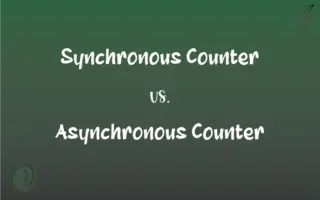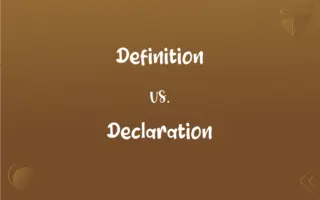Marxism vs. Communism: What's the Difference?
Edited by Harlon Moss || By Janet White || Published on October 23, 2023
Marxism is a socio-political and economic theory proposed by Karl Marx and Friedrich Engels, whereas Communism is a political ideology and socioeconomic system advocating for a classless society with collective ownership.

Key Differences
Marxism originated from the writings of Karl Marx and Friedrich Engels, primarily in the "Communist Manifesto" and "Das Kapital." It offers an analysis of society and its inherent class struggles. Communism, on the other hand, is a broader political and socioeconomic system that seeks to establish a stateless and classless society where property is collectively owned. While all Marxists might advocate for Communism, not all Communists adhere strictly to Marxist theory.
Marxism is a framework for analyzing societal structures, emphasizing the role of class struggle in historical change. It's not prescriptive in the way a society should be structured but offers a critique of capitalist systems. Communism is more prescriptive, aiming for a particular societal structure where there's no private ownership, and wealth and power are distributed based on need.
Over time, Marxism has been interpreted and reinterpreted, leading to various branches like Leninism, Maoism, and Trotskyism. Communism, however, has seen real-world applications in countries like the USSR, China, and Cuba, often blending with local ideologies and resulting in diverse implementations, sometimes diverging from pure Marxist thought.
From a Marxist perspective, capitalism inherently exploits the proletariat (working class) for the benefit of the bourgeoisie (owning class). Marxists view this as a transient phase in human history and believe it will inevitably lead to Communism. In a Communist economy, production and consumption are based on communal needs, abolishing the market dynamics of capitalism.
Marxism critiques the state as an apparatus for the bourgeoisie to control the proletariat. In contrast, in many Communist states, a "dictatorship of the proletariat" is established as a transitional phase towards a fully Communist, stateless society.
ADVERTISEMENT
Comparison Chart
Origin
Theories of Karl Marx and Friedrich Engels
Broader ideology of a classless, stateless society
Nature
Analytical framework
Socioeconomic and political system
Implementation
A theory not always fully realized in practice
Realized in states like USSR, China, and Cuba
Economic Principles
Critiques capitalism's class structures and inequalities
Advocates collective ownership without class distinctions
Relationship with State
Views the state as an instrument of bourgeoisie control
Often uses the state as a means to achieve Communist goals
ADVERTISEMENT
Marxism and Communism Definitions
Marxism
A theory analyzing class struggles and societal change.
Marxism highlights the inherent conflicts between workers and owners.
Communism
Seeks to eliminate social inequalities by redistributing wealth.
Communism aims for a society where each individual's needs are met.
Marxism
Originated from the ideas of Karl Marx and Friedrich Engels.
Marxism was introduced in texts like Das Kapital and The Communist Manifesto.
Communism
Often associated with Marxist theory, but can diverge in practice.
Though Communism has roots in Marxism, not all Communist states strictly adhere to Marxist principles.
Marxism
Emphasizes material conditions in shaping history.
According to Marxism, economic factors predominantly drive societal changes.
Communism
A political ideology advocating for a classless, stateless society.
Communism envisions a world without social hierarchies.
Marxism
Critiques capitalism as exploitative.
Marxism views capitalist systems as inherently benefiting the bourgeoisie at the proletariat's expense.
Communism
A theoretical economic system characterized by the collective ownership of property and by the organization of labor for the common advantage of all members.
Marxism
Has influenced various political movements worldwide.
Many revolutions in the 20th century drew inspiration from Marxism.
Communism
A system of government in which the state plans and controls the economy and a single, often authoritarian party holds power, claiming to make progress toward a higher social order in which all goods are equally shared by the people.
Marxism
The political and economic philosophy of Karl Marx and Friedrich Engels in which the concept of class struggle plays a central role in understanding society's allegedly inevitable development from bourgeois oppression under capitalism to a socialist and ultimately classless society.
Communism
The Marxist-Leninist doctrine advocating revolution to overthrow the capitalist system and establish a dictatorship of the proletariat that will eventually evolve into a perfectly egalitarian and communal society.
Marxism
Alternative case form of Marxism
Communism
Any far-left political ideology or philosophy advocating holding the production of resources collectively, especially by seizing it through revolution.
Marxism
A system of economic and political thought, originated by Karl Marx, and elaborated by others. It holds that the state has been the a device for suppression of the masses, allowing exploitation by a dominant (capitalistic) class; that historical change occurs through class struggle; and that the capitalist system will inevitably wither away to be superseded by a classless society.
Communism
Any political social system that implements a communist political philosophy.
Marxism
The economic and political theories of Karl Marx and Friedrich Engels that hold that human actions and institutions are economically determined and that class struggle is needed to create historical change and that capitalism will untimately be superseded by communism
Communism
The international socialist society where classes, money, and the state no longer exist.
Communism
A scheme of equalizing the social conditions of life; specifically, a scheme which contemplates the abolition of inequalities in the possession of property, as by distributing all wealth equally to all, or by holding all wealth in common for the equal use and advantage of all.
Communism
A form of socialism that abolishes private ownership
Communism
A political theory favoring collectivism in a classless society
Communism
Prioritizes collective ownership over private ownership.
In Communism, resources and means of production are owned by the community.
Communism
Has been implemented in various countries with differing outcomes.
While Communism as an ideal remains consistent, its real-world applications, like in the USSR or China, have varied.
FAQs
What's the core principle of Marxism?
Marxism emphasizes class struggle and material conditions as driving societal change.
Can a country be Marxist?
A country can be influenced by Marxist thought, but Marxism itself is a framework for analysis, not a form of governance.
Did Karl Marx create Communism?
Marx provided the theoretical foundation for Communism, but the ideology predates him and has evolved since.
Is Communism the same as Socialism?
No, while both advocate for collective ownership, Communism seeks a classless, stateless society, whereas Socialism can coexist with states and class structures.
How does Marxism explain historical change?
Through the lens of material conditions and class struggles.
How does Marxism view capitalism?
As an exploitative system where the bourgeoisie profits off the proletariat's labor.
How have real-world implementations of Communism varied from Marxist theory?
While Marxism provides a critique and vision, real-world Communism often mixes with local ideologies and conditions, sometimes diverging from pure Marxist thought.
Why do some Communist states have authoritarian governments?
Many argue it's a transitional phase, the "dictatorship of the proletariat," toward achieving full Communism.
Are all Communists Marxists?
No, while Marxism has influenced Communism, there are non-Marxist forms of Communism.
Is Marxism deterministic?
While it suggests certain historical inevitabilities, like capitalism leading to Communism, it doesn't deny human agency.
What's the end goal of Communism?
A stateless, classless society where resources are collectively owned and distributed based on need.
How does Communism address individual rights?
This varies by implementation, but classical Communism prioritizes collective over individual rights.
Is Communism anti-religion?
Classical Marxism views religion as an "opiate of the masses," but Communism's stance on religion varies by country and interpretation.
Are there different types of Communism?
Yes, like Leninism, Maoism, and Trotskyism, reflecting different interpretations and strategies.
Is Marxism only about economics?
While it heavily focuses on economic structures, Marxism also delves into societal relations, politics, and culture.
Why do some people oppose Communism?
Reasons vary, including concerns over individual rights, economic inefficiencies, or historical implementations.
Can a country transition peacefully to Communism?
In theory, yes, but many historical attempts involved revolutions.
Can you have a Communist state?
Ironically, true Communism seeks a stateless society, but many "Communist states" represent transitional phases with centralized control.
What's "Cultural Marxism"?
A controversial term, often used critically, referring to the application of Marxist thought to culture and identity rather than economics.
How does Marxism view the state?
As a tool the bourgeoisie uses to maintain control over the proletariat.
About Author
Written by
Janet WhiteJanet White has been an esteemed writer and blogger for Difference Wiki. Holding a Master's degree in Science and Medical Journalism from the prestigious Boston University, she has consistently demonstrated her expertise and passion for her field. When she's not immersed in her work, Janet relishes her time exercising, delving into a good book, and cherishing moments with friends and family.
Edited by
Harlon MossHarlon is a seasoned quality moderator and accomplished content writer for Difference Wiki. An alumnus of the prestigious University of California, he earned his degree in Computer Science. Leveraging his academic background, Harlon brings a meticulous and informed perspective to his work, ensuring content accuracy and excellence.







































































